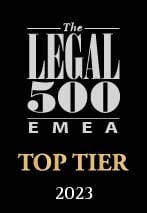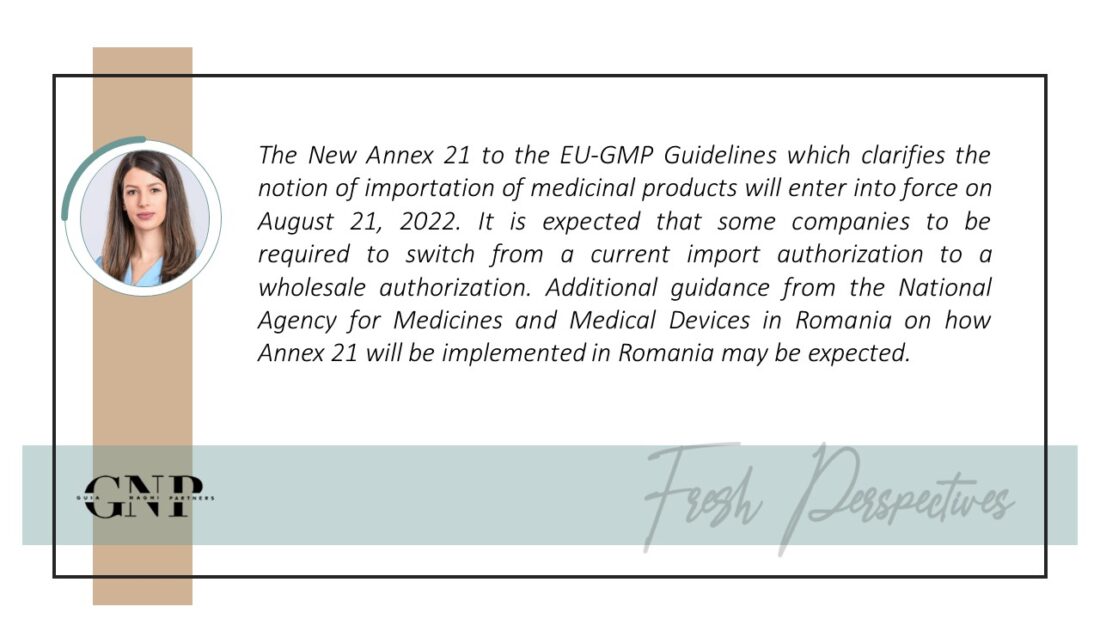Alina Stoica – The New Annex 21 to the EU-GMP Guidelines. Long-awaited clarifications on imports of medicines
Diversification of trade relations in the pharmaceutical field led to a non-unitary practice of national authorities regarding the interpretation and application of regulations for import of medicines. Although there are uniform rules at EU level which describe the minimum standard and conditions that an importer of medicines must meet in performing its activity, the notion of importation remained devoid of common understanding at EU level.
Pursuant to EU legislation, in order for a company to perform importation activities for medicines, a manufacturing authorization for import activities (“import authorization”) is required. In order to obtain such an authorization, the company must have in place specific procedures and personnel, in order to perform the proper verifications of the imported medicines (e.g., documented pharmaceutical quality system, product quality review procedure, qualified person). These conditions are provided in addition to the general conditions usually applicable to wholesale activities.
The specific situation that gave rise to divergent views came when a medicinal product was supplied from a warehouse established in the EEA/EU, but the product was invoiced by a non-EEA/EU based company. Only few member states (including Romania) considered that, in such a case, an import authorization is required, while most member states considered that the wholesale authorization is required. The solution to which most member states adhered seems to be the logical one, because the verification requirements imposed by the regulatory framework for imported medicinal products brings no added value for those medicines which have already physically entered the EEA (the verifications being already performed).
These situations, in which the ownership of the medicinal products is taken-over from a non-EEA/EU county, but the product itself is not physically imported into the EU/EEA seems to be clarified in a new annex to the Good Manufacturing Practice (GMP) Guidelines.
The emergence of a new Annex
Following multiple discussions, on February 16, 2022, the European Commission published a new annex to the GMP Guidelines – Annex 21 entitled “Importation of medicinal products” – which, besides summarizing the requirements for performing import activities, also clarifies the term “importation”, as follows:
| “the term importation refers to the action of physically bringing a medicinal product, from outside the territory of EEA/EU; fiscal transactions are not part of this annex” |
Thus, it may be observed that the EU regulator finally aligned member states to the rule of thumb, aiming at eliminating the few cases in which a national authority requires an import authorization for medicinal products physically delivered from within the EEA/EU. In this regard, Romania, as one of the few member states following this minority interpretation, is now required to enforce the new rules.
The expected impact
It is expected that, based on Annex 21, a wholesale authorization will be required for all cases in which medicinal products are physically delivered from within the EEA/EU. Therefore, there may be cases where companies will be required to switch from a current import authorization to a wholesale authorization.
However, the exact manner in which the implementation of Annex 21 is to be performed is yet unclear. On the one hand, Annex 21 enters into force 6 months following its publication, specifically on August 21, 2022. On the other hand, obtaining a new wholesale authorization is not a simple formality, being a lengthy and complicated process. Furthermore, the overall EU-GMP Guidelines are transposed in Romania by way of Decision of the Scientific Council of the National Agency for Medicines and Medical Devices in Romania – i.e., the authority in charge with issuing import / wholesale authorizations. Therefore, additional guidance from the National Agency for Medicines and Medical Devices in Romania on how Annex 21 will be implemented in Romania may be expected.





No Comments